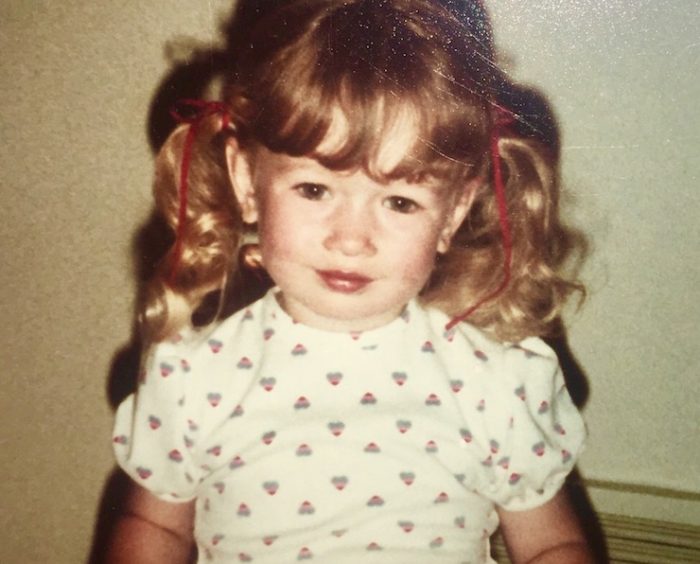Like many empathic, intuitive humans, I knew I was different from a young age.
I remember knowing when adults were lying, being in tune with the energy of a room, and easily able to judge a situation or person simply by what I was feeling. I could immediately sense if my teacher was in a bad mood or if the kid sitting next to me had issues going on at home.
Looking back, I always felt as though I was missing an extra layer of protection around me—I felt like that 3D diagram from science class depicting the human body with only the muscles and no skin to protect it. Like many of us, I felt over-exposed and under-qualified to take on the outside world.
While I used to believe that my home life growing up hindered my empathy and intuition, I can now see how it helped me hone in on my hyper-sensitivity. As painful as it was, my childhood home was the training ground that helped me embrace and understand the language of my empathic nature.
It wasn’t until much later in my life that I realized I was not only an empath, but the child of a narcissist. And while these terms are blindly thrown around these days, understanding the dynamic of empaths and narcissists is what helped me unravel the loose threads of my 37 years on this planet. It was like somebody had given me a handbook on how to dissect my childhood and make sense of my life.
Many of us grew up knowing something wasn’t quite right, but not being able to put our finger on it. And like most children of narcissists, we lived under the unwritten rule: there’s nothing wrong, so don’t tell anyone.
Problems inevitably arise because empaths cannot live in a smoke-and-mirrors environment without eventually rebelling against the notion. Our very essence is hard-wired to tell the truth and call out bullsh*t when we see it.
It can be incredibly draining to experience such a deep knowing about the world around us, especially as a small child, when ethnocentric thinking leads us to believe our world is confined to the walls we sleep between. It becomes even more confusing when we are the child of a parent who is a narcissist, considering it is our parents who help shape our basic ideas surrounding love, self-worth, and identity.
It’s important to understand the traits of a narcissistic parent before we can truly internalize the reasons we feel more sensitive and empathic than most. When we understand the type of person we’re dealing with, it makes it easier to accept that nothing was inherently wrong with us.
We knew all along something wasn’t quite right.
The language of a narcissist parent is dependent on their own needs being met, making the love they give to their child highly conditional. The highs match the lows, and being in their good graces is always fleeting. Because of this, we become highly sensitive, in-tune, and compassionate to the outside world, yet always on guard and waiting for their next attack. Our value feels based on how we can best serve, love, and protect this parent. It’s as if we hold the empathy they were not able to. And—as we can all testify—it’s heavy.
Many of us come to realize we were nothing but pawns in their self-fulfilling game of deception.
This epiphany can feel both debilitating and freeing, simultaneously. Threatening their reputation by breaking away and refusing to live in their fantasy world becomes a nearly impossible feat. Because we know we will no doubt be punished for being seekers, truth-tellers, and striving to rise above the abuse we have endured.
We may question our own sanity, feel crazy, and struggle to express these feelings to others who couldn’t possibly understand what it’s like to be in the emotional grips of a person who is supposed to love us unconditionally. And while it may seem that this dichotomy negates our empathic nature, the truth is that it’s meant to draw us closer to our intuition and fine-tune our senses. There are many instances where we may have felt misled, but if we trace it back, we can almost always realize we knew intuitively we were being deceived.
We learned to apologize for everything, keep the peace, and not rock the boat. We had to learn to read the energy of this parent and react accordingly to appease them. We may have felt like nothing we did was good enough, perfect enough, or worthy enough of recognition. In turn, we sought approval from the outside world in attempts to heal this wound from our childhood.
When they lose control of us—financially, spiritually, physically, or emotionally—is when we are put to the test of trusting ourselves to step into self-empowerment and aligning with our core beliefs. Someone once told me that narcissists don’t have relationships, they take hostages, and our job is to escape. This is the true test of following our intuition and using our empathy to remain true to our higher callings and ability to transcend their manipulation. We can give ourselves the grace we weren’t given by this parent.
Narcissistic parents are almost always the victims, even when they’ve created their circumstances themselves. They don’t have the ability to look in the mirror and see what they need to change about themselves. Instead, they point fingers and project their deepest insecurities onto those around them. Oddly, they will have certain people they keep close. These people are the ones who stroke their ego and empower them in their choices, no matter how destructive these choices may be.
The dynamic between a narcissistic parent and empathic child can be confusing because to the outside world, these parents are charming, captivating, and even admired. They’re often entertaining, charismatic, agreeable, and the life of the party. They also come across as giving, peaceful, and kind-hearted.
This paradox can make it difficult for the child to determine which parts of their parent is real. Considering narcissists will rarely apologize or take blame for their wrongdoings, this can leave the empathic child feeling as if they’re going crazy, thus making them doubt their intuition.
When the narcissist’s entitlement is threatened, the child will most likely be punished. It’s important to keep in mind that the most loving thing we can do for ourselves (and them) is refuse to play their games, and nothing we do can heal their inability to empathize. We are dealing with people who won’t think twice about jeopardizing the emotional, financial, or physical health of another for their own self-serving needs.
When we make this choice, it’s often true they won’t just go away peacefully. They’ll often go to extremes to be heard and will try and involve third parties if they cannot get hold of us personally. This is done in order to maintain the illusion of their control over us.
My personal emancipation took the form of blocking this person from every aspect of my life.
If you relate to anything above, and you’re on the path to reclaiming your identity and intuition, here are three key points to keep in mind if you want to empower your path forward as an empath.
Tapping into our intuition is a vital part of the healing process.
For many of us, our empathy and intuition during childhood was a basic survival mechanism used to keep ourselves safe from the rage and unpredictability around us. Today, as adults, it’s imperative to change how we narrate the story surrounding these character traits. They are gifts, and we can use them to benefit our own life path and those around us.
When we do this, we not only take our power back, but we also begin to make sense of all the times our human lie detectors were spot on. I used to believe this parent took away the woman I could have been. I now realize he was a vital piece in learning to trust myself and honor the sensitivity I embody. We can all be more self-aware, empathetic, and grounded in our experiences and relationships because of them.
Our wounds are our portal to our truest selves and the contrast of not trusting ourselves at times when we knew something wasn’t right is why we can trust ourselves, after all. We knew, and we’ve always known, and we will always know. It’s who we are.
We are worthy of love.
Many of us have found ourselves in unhealthy relationships that mirrored our deepest wounds with our narcissistic parent. And, intuitively, we knew it from the get-go. But, we accepted the love we believed we deserved.
If we can see this, learn from it, and internalize that we’re worthy of real, unconditional love, we can heal this wound for ourselves and the generations that follow. Toxic, conditional, and draining relationships are not our birthright, and if we can understand why we adapted these limiting beliefs surrounding what love encompasses, we cannot only break the pattern, but attract true, unconditional love in all its forms.
Yes, having a narcissist for a parent may have led us to believe we aren’t worthy of love. On the contrary, we are a reflection of love, only love, and not responsible for their lack of empathy.
Their shortcomings are simply a barrier within themselves. They cannot soften to us, or emotionally meet us where we need them to, because they cannot do this for themselves. In fact, our strong intuition is a threat to their way of being.
We don’t have to settle. We don’t have to accept what was shown to us. The more compassion and empathy we show ourselves, the easier it becomes to selectively choose who gets our time and attention. It’s okay to let the things that were once only red flags become deal breakers.
Shutting down our empathic nature is not the solution.
Some of us shut our intuition down only to become sick, addicted, depressed, or anxiety-ridden. I, for one, fell deep into an eating disorder and was stuck in second gear for almost 10 years. It took years of therapy and deep emotional work to find my worth and sense of self again. I had been so enmeshed with this parent that I truly believed I could not live without them. When I began doing this work, and never looked back, my intuition followed.
Although many of us have unconsciously been taught to shield or hide our sensitivity; it’s important to remember this is not beneficial. In fact, our empathy should be embraced and used to channel hurtful experiences into healing, not only for ourselves, but for those who can find solace in our stories of vulnerability and strength. The key is practicing great self-care and remaining grounded in our sensitivity.
If we’re paying attention, we are often aligned with experiences, creative gifts, and outlets to become truth-tellers. These can take the form of writing, painting, music, or public platforms where we feel called to participate. Our emotions and bodies have always been truth-tellers, so it would make sense we would feel called to find ways to manifest in the outside world.
Regardless of where we’re at in our relationship with ourselves or this parent, may we all find peace knowing that we can’t save the world or anyone in it, but we can save ourselves while the world watches.








Read 60 comments and reply